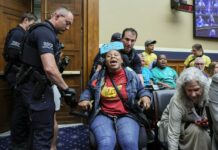
(GA Recorder) — When the sun rises Wednesday morning, Georgians will hopefully know who will represent them in the U.S. Senate for the next six years.
Democrats are hoping to elect incumbent Sen. Raphael Warnock and end their year on a happy note. Though the party outperformed expectations nationwide, just narrowly losing control of the U.S. House, the Georgia GOP dominated statewide races, with the exception of the Senate race.
Warnock received nearly 38,000 more votes than Republican Herschel Walker in the Nov. 8 general election, but neither of them surpassed 50% of the vote, sending the race to a high-stakes runoff that was boiled down to just four weeks.
Republicans have been dreaming of a Walker win, which will keep the Senate at the 50-50 status quo. That means Vice President Kamala Harris would keep her tie-breaking vote, but Democrats would be denied an advantage on committee assignments, further reining in their ability to pass legislation.
Unlike in 2020, when Warnock and fellow Democrat Jon Ossoff helped deliver the Senate to Democratic hands in one fell swoop, the Senate will remain in Democratic control no matter who wins, but the stakes remain high, said Emory University political science professor Andra Gillespie.
“When the Senate is divided 50-50, it does give the minority power, more leverage, and there’s usually a power-sharing arrangement about how things are going to go. And with an outright majority, the Democrats won’t have to divide committee memberships, so it does actually matter.”
A 51st member will also make it easier for Democrats to confirm judicial and administrative appointments, said Daniel Paul Franklin, associate professor emeritus of political science at Georgia State University, and potentially even aid them in passing legislation despite the cloture rule requiring 60 votes to end debate in most cases.
“It’s possible, given how close Republican control of the House is, the Democrats may be able to get some legislation passed by peeling off a few Republican votes. I mean it’s possible. So in that case, control of the committees is going to be very important because you have to be able to advance bills out of committee,” he said.
Whoever wins will serve a full six-year term, and Democrats are hoping to build a buffer against potential future losses, Gillespie said.
“In 2024, Joe Manchin, Jon Tester, and Sherrod Brown are all up for reelection. They’re all red state Democrats,” she said, referring to senators from West Virginia, Montana, and Ohio.
“And so knowing that there are some vulnerabilities going into the 2024 cycle, if they have an additional seat, they have at least a one-seat buffer. It will not be enough to be able to make up for all three seats, but if something were to happen to one of those, then assuming that nothing else has changed on the Senate map, that would allow the Democrats to maintain control of the Senate.”
A scramble to turn out voters
The early vote in the race, which ended Friday, has shattered records for Georgia’s runoff, though it is difficult to draw direct comparisons because the length of the runoff was shortened by the state’s new election law.
White voters cast just over 1 million votes with a turnout rate of 28.1%, representing a little more than half of the early voting electorate, while Black voters cast more than 595,000 ballots with a turnout rate of 29.2% and making up 31.9% of the early vote.
The high turnout among Black voters as well as a spike in voters between 18 and 24 appears to be good news for Warnock, as those groups tend to favor Democrats. But the only tally that matters is the one counted Tuesday night, and Election Day could continue to see huge participation – the Secretary of State’s website lists more than 1.8 million early votes cast but records 7 million total active voters, many of whom could be planning to cast their ballot on Election Day.
Both sides have made turnout the center of their strategies, and their final day on the campaign trail saw them return to their strongholds to drum up last-minute support from their respective bases.
Warnock was in Atlanta to meet with Teamsters and Georgia Tech students, and Atlanta rapper Killer Mike ahead of a final evening rally.
“If you’ve already voted, your assignment is not yet done,” he told the crowd of Tech students. “Your assignment is to get some more of your friends. Matter of fact, call your father and your mother, your sister and your brother. Call Lottie, Dottie, and everybody. Tell them it’s time to vote.”
Walker spent his last day on the trail driving across bright-red north Georgia, with stops in Flowery Branch, Dawsonville, Ellijay and Calhoun before wrapping things up at a gun store in suburban Kennesaw with former U.N. Ambassador Nikki Haley.
“This is about turnout, and now that means that we got to get into the game, and you can’t sit on the sideline anymore because if we sit on the sideline, y’all see what we’re gonna get. We’re gonna get people that you can’t trust anymore,” Walker said.
“Whoever has voted, get your friends to vote, call your friends to vote; this is so important. And I say this, if you don’t have friends, what do you need to do? Make some friends and get them out to vote, pick up some friends,” he added.
The final four weeks have featured a frenzy of door-knocking, texting and phone banking as big names fly in from out of state to rally voters to the polls.
Former President Barack Obama came to Atlanta to stump for Warnock last week, but President Joe Biden has been absent from the state, although he did work the phones for him last week at a fundraiser in Massachusetts. Likewise, Walker’s rallies have featured a host of fans of former President Donald Trump, but the man himself has not held an event in state since before the primary.
Neither man is particularly popular among Georgia voters. An Emerson College poll released Dec. 1 found Biden at a 42% approval rating in the state, with 52% saying they disapprove of his job as president. But in a hypothetical 2024 presidential race, 44% of respondents said they would vote for Biden and only 43% said they would vote for Trump.
Trump was a major figure in getting Walker into politics. The two have been friends since Walker, a former football star, played for the Trump-owned New Jersey Generals in the short-lived United States Football League.
Trump’s endorsement and Walker’s fame as a Georgia Bulldogs champion helped him trounce the competition in May’s GOP primary. Walker won 68% of the vote in a six-man race, with Secretary of Agriculture Gary Black placing a distant second with 13% of the vote.
But for the most part, Trump’s endorsement did not hold the magic it once did for Georgia Republicans. Other than Walker, only one other Trump-backed candidate was elected from a slate of his preferred Georgia candidates.
A Walker win, though, could put a little pep in Trump’s step as he heads into his 2024 presidential election bid.
‘A seriously flawed candidate’
Some conservative politicos have grumbled that a mainstream conservative like Black would have fared better in a general election given Walker’s lack of political experience and the scandals that have beset his campaign.
Despite strong Republican turnout in November, Walker got about 200,000 votes fewer than Republican Gov. Brian Kemp, who won handily over Democrat Stacey Abrams.
“The fact that he is a seriously flawed candidate may have resulted in a dropoff of 10% of a highly partisan vote,” Franklin said. “So yeah, I think if you had a more traditional candidate, Warnock might not have made the runoff and we might be awaiting the swearing-in of a Republican senator.”
Kemp has tried to transfer some of his success to Walker in the runoff. After running separate campaigns all year, Kemp campaigned with Walker last month and recorded an ad urging voters to support Walker.
Walker has been open about a history of mental illness – he says he has been diagnosed with dissociative identity disorder, previously called multiple personality disorder, and that he has sought treatment and overcome the disease.
But opponents say Walker has not been open about a history of violent behavior not associated with dissociative identity disorder. An ex-wife described an incident in which he held a gun to her head. A former girlfriend told the Daily Beast about an incident in which Walker laid his hands on her after she caught him with another woman. His son, conservative commentator Christian Walker, said his family had to move six times in six months “running from your violence.”
Over the summer, Walker’s campaign dealt with a series of reports detailing children Walker had fathered but not disclosed publicly, even to campaign staff. Two anonymous women have come forth with claims Walker encouraged them to have abortions despite Walker now running on an anti-abortion platform.
Walker has been accused of falsely inflating his academic record and business success. He was chastised by a moderator during the race’s one and only debate after he flashed a badge to bolster the false claim that he was a law enforcement officer.
Walker’s team has sought to tarnish Warnock’s reputation, running an ad with police body cam footage from a 2020 incident in which Warnock’s ex-wife told police he ran over her foot after an argument. Police found no sign of visible injury to her foot and Warnock was not charged with a crime.
Walker has also attacked Warnock over his church’s ownership of an Atlanta apartment complex described as decrepit and dangerous to residents. At events, Walker calls Warnock a hypocrite for pledging to help the poor while residents are evicted from the complex, styling his runoff bus tour as the “Evict Warnock” tour. A spokesperson for the company that manages the building told the Atlanta Journal-Constitution that no tenants have been evicted for not paying rent since June 2020, and neither Warnock nor the church are involved in the building’s operation.







